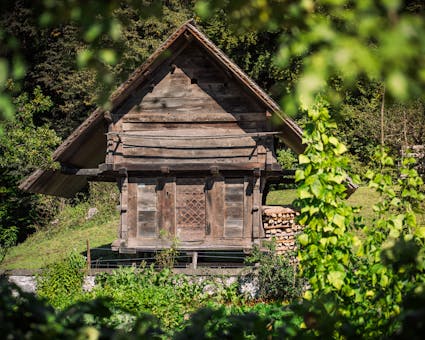532 – Granary from Ecoteaux Vaud, 1500–1530
The village of Ecoteaux lies about ten kilometres (six miles) above Vevey. This grain store stood outside of the village on the Sonnay farm domain.
A granary in two parts
The village of Ecoteaux lies about ten kilometres (six miles) above Vevey. This grain store stood outside of the village on the Sonnay farm domain, but in two sections! The lower part, covered over with a sheet of metal, stood at the edge of a forest, where it served as a small stall. The upper part served as a dovecote on the farm itself, saddled on a pig sty. A friend of the Ballenberg Open-Air Museum discovered these building parts, identified them and was able to rescue this two-storey granary.

Copied from the neighbours
The building follows the stylistic pattern of the neighbouring countryside south of the Lake of Geneva: for instance, the door lock is reminiscent of Savoy – the key must be inserted horizontally to open the lock. The steep roof and the curved decoration of the corner posts imitates the gothic wooden granaries of the neighbourhood to the northeast (Fribourg and Berne). Regional house styles exhibit transition zones in which architecture from various geographical directions are found in one and the same building.

Oak as a characteristic
This type of granary is documented for nearly 600 years in the canton of Vaud, at that time still under the rule of the Savoyard monarchy. In the 1930’s the private researcher Emile Gavillet counted 158 of them in the canton! They are timber framed buildings which, like this one in Ecoteaux, are nearly all made of oak. A shingle roof is characteristic of these typical Vaud oaken granaries. Wide eaves serve to provide shelter for firewood (faggots) and tools.
Both massive and dainty
A framework of massive timbers rests on stone foundations to serve as a base for the building. Posts like graceful feet stand on the framework to raise the body of the granary further from the ground. Damp is like poison for the stored grain. The grain storeroom itself is small, the lower portion rather dainty. It is about three by three metres (ten feet by ten). The upper storey protrudes beyond the lower as is common in granaries. The corner posts are formed as columns to serve as decorative elements. The door is painted. The lock exhibits finely engraved patterns – yet it is solid, since the granary is the farmer’s moneybag.

Ballenberg
Swiss Open-Air Museum
Museumsstrasse 100
CH-3858 Hofstetten bei Brienz
Opening hours Administration
3 November 2025 to 8 April 2026
From Monday to Friday
8.30 am to 11.30 am
1.30 pm to 4.30 pm
Opening hours
9 April to 1 November 2026
10 am to 5 pm daily